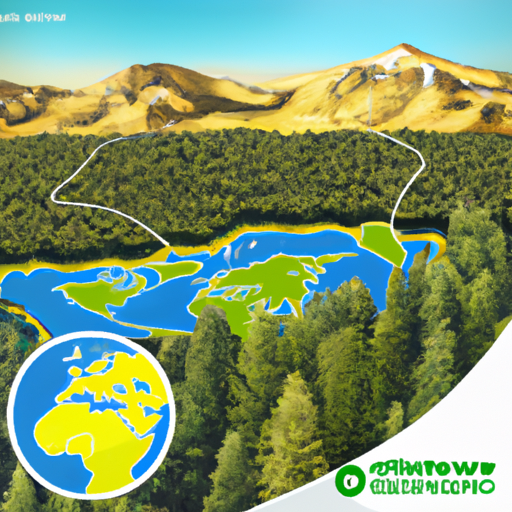Are you curious about eco-tourism? This article will provide you with a simple and concise explanation. Eco-tourism is all about sustainable travel, making an effort to preserve the environment and support local communities. It combines the excitement of exploring new places with the responsibility of minimizing our impact on the planet. Whether you’re interested in wildlife conservation, cultural immersion, or outdoor adventures, eco-tourism offers a unique and fulfilling way to experience the world around us. So, what is eco-tourism? Let’s embark on a journey to discover the beauty and benefits of eco-tourism together!

Check Out Our Top Eco Friendly Product Picks On Amazon Here
Definition of Eco-tourism
Understanding the concept
Eco-tourism, also known as ecological tourism, is a form of travel that focuses on exploring natural environments while maintaining a minimal impact on the environment and promoting sustainable practices. It involves visiting natural areas, such as parks, forests, and wildlife reserves, with the aim of appreciating and preserving their natural beauty and biodiversity.
Eco-tourism goes beyond traditional tourism by prioritizing ecologically responsible practices and seeking to create positive impacts on local communities and the environment. It encourages travelers to participate in activities that contribute to the conservation and preservation of natural resources, while also respecting and celebrating local cultures and traditions.
The origins of eco-tourism
The roots of eco-tourism can be traced back to the 1960s and 1970s when an increasing number of people began to express concerns about the negative impacts of traditional tourism on the environment. During this period, environmental movements gained momentum, and there was a growing desire to protect fragile ecosystems and promote sustainability.
Several key figures and organizations played a crucial role in the development of eco-tourism. One notable figure is Hector Ceballos-Lascurain, a Mexican architect and environmental activist who coined the term “eco-tourism” in 1983. His work helped to popularize the concept and build awareness around the need for responsible tourism.
How it differs from traditional tourism
Eco-tourism distinguishes itself from traditional tourism in several ways. While traditional tourism often focuses on entertainment and leisure, eco-tourism prioritizes sustainability and environmental conservation. In traditional tourism, the primary goal may be to maximize profit and provide comfort for tourists, whereas eco-tourism places equal importance on the well-being of the environment, local communities, and future generations.
Unlike traditional tourism, which may prioritize the development of popular tourist destinations, eco-tourism seeks to minimize the negative impacts of tourism on natural resources, ecosystems, and wildlife. It promotes responsible travel practices, such as reducing waste, conserving water, and minimizing the carbon footprint. Eco-tourism also aims to educate and raise awareness about environmental issues, fostering a sense of environmental responsibility among travelers.
Principles of Eco-tourism
Conservation and preservation of natural resources
At the core of eco-tourism is the conservation and preservation of natural resources. Eco-tourism activities should have minimal impact on the environment and strive to protect the fragile ecosystems they visit. This principle emphasizes the importance of maintaining the integrity of natural habitats, ensuring that future generations can continue to enjoy their beauty and biodiversity.
Economic benefits for local communities
Eco-tourism aims to provide economic benefits for local communities, contributing to their development and well-being. By supporting local businesses, employing local guides, and investing in community-driven projects, eco-tourism helps to empower local communities and reduce poverty. When tourists engage in sustainable and responsible practices, their expenditures have a positive impact on the local economy.
Education and interpretation
A key principle of eco-tourism is education and interpretation. Eco-tourism providers strive to educate travelers about the importance of environmental conservation, the unique qualities of the ecosystems they visit, and the role they can play in protecting these natural resources. Interpretive programs, guided tours, and educational materials help to enhance travelers’ understanding and appreciation of the natural and cultural heritage of the destinations they visit.
Respect for local culture and traditions
Eco-tourism promotes respect for local culture and traditions. Travelers are encouraged to engage with local communities, learn about their way of life, and show appreciation for their cultural practices. By respecting and celebrating local cultures, eco-tourism helps to preserve cultural heritage and maintain the authenticity of the destinations.
Sustainable development
Sustainable development is a fundamental principle of eco-tourism. It involves meeting the needs of the present without compromising the ability of future generations to meet their own needs. Eco-tourism practices should be socially, economically, and environmentally sustainable. This means that tourism activities should provide benefits to local communities, promote economic growth, and preserve the natural environment for future generations to enjoy.
Environmental responsibility
Eco-tourism places a strong emphasis on environmental responsibility. It encourages travelers to act in a way that minimizes their impact on the environment and reduces harm to local ecosystems. This principle includes practices such as minimizing waste, conserving water and energy, and adopting sustainable transportation methods. Travelers are also encouraged to support initiatives that promote environmental conservation.
Types of Eco-tourism
Wildlife tourism
Wildlife tourism involves visiting natural areas with the goal of observing and appreciating wildlife in their natural habitats. This type of eco-tourism allows travelers to connect with nature and gain a deeper understanding of the importance of wildlife conservation. Wildlife tourism activities can include wildlife safaris, birdwatching tours, and visits to national parks and reserves.
Nature-based tourism
Nature-based tourism focuses on exploring and enjoying natural landscapes, such as forests, mountains, and coastal areas. It provides opportunities for activities such as hiking, camping, nature walks, and wildlife spotting. Nature-based tourism allows travelers to immerse themselves in the beauty of natural environments and develop a greater appreciation for the value of ecosystems.
Adventure tourism
Adventure tourism combines outdoor activities with eco-tourism principles. It involves engaging in physically challenging activities such as mountain climbing, whitewater rafting, zip-lining, and trekking. Adventure tourism allows travelers to experience the thrill of outdoor adventures while also promoting environmental responsibility and sustainability.
Community-based tourism
Community-based tourism focuses on engaging with local communities and learning about their culture, traditions, and way of life. Travelers have the opportunity to stay in local accommodations, interact with community members, and participate in community-led activities. Community-based tourism aims to empower local communities by providing economic benefits and preserving their cultural heritage.
Cultural tourism
Cultural tourism involves exploring and experiencing the unique cultural aspects of a destination. Travelers have the opportunity to visit historical sites, attend traditional festivals, try local cuisine, and learn about the customs and traditions of the local community. Cultural tourism promotes the preservation of cultural heritage and facilitates cross-cultural understanding and appreciation.
Benefits of Eco-tourism
Preservation of natural habitats
One of the key benefits of eco-tourism is the preservation of natural habitats. By promoting responsible travel practices and minimizing the impact on natural environments, eco-tourism helps to protect and conserve fragile ecosystems. This preservation ensures that future generations can continue to enjoy the beauty and biodiversity of these areas.
Conservation of biodiversity
Eco-tourism plays a significant role in the conservation of biodiversity. By raising awareness about the importance of protecting wildlife and their habitats, eco-tourism encourages travelers to become advocates for conservation. The economic benefits generated by eco-tourism activities also contribute to funding conservation efforts and supporting initiatives aimed at protecting endangered species and preserving biodiversity.
Support for local economies
Eco-tourism provides economic benefits for local communities. When travelers choose eco-friendly tours and activities, their expenditures go directly to local businesses and communities. This support helps to stimulate local economies, create job opportunities for community members, and reduce reliance on unsustainable practices such as deforestation or extractive industries. The economic benefits of eco-tourism can help to alleviate poverty and improve the standard of living for local communities.
Promotion of environmental awareness
Eco-tourism promotes environmental awareness by providing opportunities for travelers to connect with nature and learn about the importance of environmental conservation. Through guided tours, educational programs, and interpretive materials, travelers gain a deeper understanding of the fragility of ecosystems, the importance of biodiversity, and the need to protect natural resources. This increased awareness can lead to behavior changes and the adoption of sustainable practices both during and after travel.
Empowerment of local communities
Eco-tourism empowers local communities by providing them with economic opportunities and promoting cultural preservation. By participating in eco-tourism activities, local communities can showcase their cultural heritage, traditional practices, and natural resources. This empowerment fosters a sense of pride and ownership, as well as providing income-generating opportunities that allow communities to invest in their own development and ensure the preservation of their cultural identity.

Challenges of Eco-tourism
Balancing sustainability and profitability
One of the major challenges in eco-tourism is balancing sustainability and profitability. While eco-tourism aims to promote sustainability, there is also a need to generate income to support conservation efforts and provide economic benefits to local communities. Finding a balance between these two objectives can be a delicate task, as the pressure to generate profits may lead to compromising sustainable practices.
Negative impacts on fragile ecosystems
Despite its intentions, eco-tourism can sometimes have negative impacts on fragile ecosystems. Even with responsible practices, the presence of tourists in natural areas can disrupt the natural behavior of wildlife and cause stress to sensitive species. Additionally, the construction of infrastructure and the increased foot traffic can lead to habitat degradation and soil erosion. Careful planning and monitoring are necessary to minimize these impacts.
Overcrowding and overtourism
Another challenge faced by eco-tourism is the issue of overcrowding and overtourism. Popular natural areas and attractions may face an overwhelming influx of visitors, which can strain local resources and cause damage to the environment. Overcrowding can also detract from the visitor experience, as the natural beauty and tranquility of the destination may be compromised. Implementing visitor management strategies and spreading tourism across different areas can help alleviate this issue.
Lack of regulation and enforcement
The lack of regulation and enforcement is a significant challenge in eco-tourism. In some destinations, there may be no clear guidelines or standards for eco-tourism operators, allowing for unsustainable practices to go unchecked. Without proper regulation and enforcement, there is a risk of exploitation of natural resources, damage to ecosystems, and a negative impact on local communities. Governments and organizations must work together to establish and enforce sustainable tourism policies.
Greenwashing and false claims
Greenwashing, which refers to the misleading marketing or promotion of unsustainable practices as eco-friendly, is a challenge in the eco-tourism industry. Some businesses may make false claims or exaggerate their environmental credentials to attract travelers. This can lead to confusion and a lack of trust among consumers, making it difficult for travelers to distinguish between truly sustainable operators and those engaging in greenwashing. Increased transparency and clearer eco-certifications are necessary to combat this challenge.
Sustainable Practices in Eco-tourism
Minimizing carbon footprint
Minimizing the carbon footprint is an important practice in eco-tourism. Operators can adopt measures to reduce greenhouse gas emissions, such as using energy-efficient transportation, promoting public transportation options, and encouraging travelers to offset their carbon emissions. Implementing energy-saving initiatives and using renewable energy sources in accommodations and facilities also contribute to minimizing the carbon footprint.
Reducing waste and promoting recycling
Eco-tourism encourages the reduction of waste and the promotion of recycling. Operators can adopt practices such as providing reusable water bottles and containers, minimizing the use of single-use plastics, and implementing recycling programs. By reducing waste, eco-tourism helps to prevent pollution, protect natural habitats, and conserve resources.
Conserving water resources
Conserving water resources is essential in eco-tourism. Operators can implement water-saving measures, such as using water-efficient fixtures and appliances, promoting responsible water usage among guests, and supporting local water conservation initiatives. It is crucial to ensure that water consumption is sustainable and that local water sources are protected.
Protecting wildlife and their habitats
Protecting wildlife and their habitats is a central practice in eco-tourism. Operators should follow guidelines and best practices to minimize disturbance to wildlife, respect their habitats, and avoid activities that contribute to their endangerment or harm. Eco-tourism also supports initiatives aimed at conserving and rehabilitating wildlife populations, such as reintroduction programs and habitat restoration projects.
Supporting local communities
Supporting local communities is a sustainable practice in eco-tourism. Operators can partner with community-based organizations, employ local guides and staff, and source products and services from local businesses. This approach ensures that economic benefits stay within the community and promotes inclusive and equitable tourism, empowering local communities and contributing to their development.
Improving energy efficiency
Improving energy efficiency is vital in eco-tourism. Operators can implement energy-saving practices, such as using LED lighting, installing energy-efficient appliances, and adopting renewable energy sources. This reduces reliance on fossil fuels and lowers greenhouse gas emissions, contributing to a more sustainable and environmentally friendly tourism industry.

Examples of Successful Eco-tourism Initiatives
Galapagos Islands, Ecuador
The Galapagos Islands in Ecuador are a prime example of successful eco-tourism initiatives. The islands are known for their unique biodiversity and are home to numerous endangered species. To protect the fragile ecosystems and wildlife, strict regulations and visitor management plans have been implemented. Only licensed tour operators are allowed to operate in the area, and visitor numbers are carefully controlled. Tourism revenue is also used to fund conservation projects and support local communities.
Costa Rica
Costa Rica is well-known for its commitment to eco-tourism. The country has made significant efforts to protect its natural resources and promote sustainability. With almost 30% of its land area protected in national parks and reserves, Costa Rica offers visitors a wide range of eco-tourism experiences, including wildlife watching, ecotourism lodges, and sustainable adventure activities. The country actively promotes sustainable practices and has become a global leader in eco-tourism.
Namibia
Namibia has embraced eco-tourism as a means of conservation and community development. The country’s extensive network of community conservancies allows local communities to participate in wildlife management and benefit from tourism activities. Visitors to Namibia can experience the stunning landscapes of the Namib Desert, encounter diverse wildlife in Etosha National Park, and learn about the cultural traditions of indigenous communities. The revenue generated through eco-tourism contributes to conservation efforts and supports local development projects.
New Zealand
New Zealand is renowned for its pristine landscapes and commitment to environmental preservation. The country offers a wide range of eco-tourism experiences, from exploring the fjords of Milford Sound to hiking through national parks and engaging in cultural activities with Maori communities. New Zealand’s Department of Conservation actively manages protected areas and works closely with tourism operators to ensure the sustainability of eco-tourism practices.
Palau
Palau, an archipelago in the western Pacific Ocean, has gained recognition for its innovative approach to eco-tourism. The country has implemented strict conservation measures to protect its marine environment, including establishing one of the world’s first shark sanctuaries and a marine reserve network. Visitors to Palau can enjoy activities such as diving, snorkeling, and kayaking while also contributing to the preservation of marine biodiversity. The success of Palau’s eco-tourism initiatives has inspired other destinations to follow suit.
How to Choose an Eco-friendly Tour
Researching the tour operator
When choosing an eco-friendly tour, it is important to research the tour operator’s sustainability practices and commitments. Look for tour operators that have clear environmental policies, support local communities, and actively participate in conservation efforts. Consider reading reviews and testimonials from previous travelers to get a sense of their experiences and the operator’s commitment to eco-tourism principles.
Considering the destination
The destination itself plays a significant role in determining the eco-friendliness of a tour. Look for destinations that have a strong commitment to sustainability, conservation, and responsible tourism practices. Consider areas that have protected areas, national parks, or UNESCO World Heritage sites, as these often indicate a commitment to preserving natural and cultural heritage.
Looking for eco-certifications or labels
Eco-certifications and labels can help identify tours and operators that adhere to recognized sustainable tourism standards. Look for certifications such as Green Globe, Rainforest Alliance, or Global Sustainable Tourism Council (GSTC) certification. These certifications ensure that operators meet specific criteria related to environmental conservation, community involvement, and sustainable practices.
Assessing the tour itinerary
When reviewing a tour itinerary, consider the activities included and how they align with eco-tourism principles. Look for tours that prioritize sustainability, minimize environmental impact, and provide opportunities for education and interpretation. Activities such as wildlife viewing, community visits, and cultural exchanges can indicate a focus on eco-tourism.
Supporting local initiatives
Choose tours that actively support local initiatives and contribute to community development. Look for tours that employ local guides and staff, partner with community-based organizations, and invest in local infrastructure and education. Supporting initiatives that empower local communities and promote cultural preservation is an essential aspect of eco-tourism.

Conclusion
Eco-tourism offers a unique and sustainable way to explore and appreciate the natural wonders of our world while respecting and preserving the environment and local communities. By adhering to eco-tourism principles, such as conservation, community support, and sustainable development, travelers can make a positive impact on the destinations they visit.
From protecting natural habitats to promoting environmental awareness and empowering local communities, eco-tourism provides numerous benefits for both travelers and the planet. By choosing eco-friendly tours and adopting responsible travel practices, we can contribute to a more sustainable and environmentally conscious tourism industry.
So, the next time you plan your vacation, consider embarking on an eco-tourism adventure and experience the beauty of nature while leaving a positive mark on the world.




